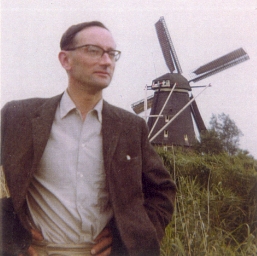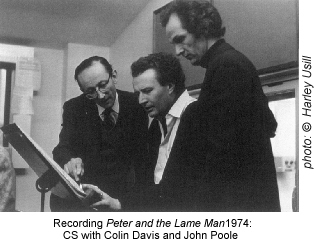|
||||
|
Home | Composers | Christopher Shaw - List of Works | Recordings | Annual Records of a Working Life |
||||
|
At once reclusive yet convivial, outspoken yet modest, single-minded yet accommodating, Shaw never saw himself as a public figure, and was not regarded as such in his lifetime. He was born in London on 30 July 1924, and died in Gatehouse-of-Fleet, Scotland, on 27 September 1995. From 1942 to1944 he studied music at Oxford University with R.O. Morris and H.K. Andrews. It was on his own initiative that he showed some of his early scores to Vaughan Williams, who was sufficiently impressed to recommend him to colleagues on the experimental side of film music. Two film scores and a lifelong interest in film music were the result. The premiere of his Clarinet Sonata of 1948-9, with the young Colin Davis as soloist, brought Shaw his first public and critical success. Like the subsequently withdrawn Suite in E for piano, the Sonata was somewhat suggestive of Hindemith in his lighter vein, though in fact it was already influenced by the kind of post-1945 12-note serial writing that retained links with tonality. Shaw's personal and, in his role as Lieder accompanist, professional contacts with Dallapiccola in the late 1940s and early 1950s left their mark on his own musical development. While the relatively approachable Clarinet Sonata found a publisher, the equally well-received but more introspective Joyce settings of 1950 remained in manuscript, as indeed did every work of the next 20 years apart from the written-to-order No Room at the Inn. (The copyrights were in due course re-assigned to the composer.) 
In 1971, Colin Davis conducted the BBC Symphony Orchestra and Chorus in the broadcast premiere of Shaw's cantata Peter and the Lame Man. The broadcast attracted wide attention and an immediate offer of publication. Characteristically, Shaw declined the offer and returned to the seclusion which was so dear to him as a composer. Meanwhile he was pursuing a successful career as accompanist, coach, translator, and instigator of touring opera. In that context, he proved the friendliest and most congenial of colleagues, but one whose professional skills and air of quiet authority earned him the respect he deserved. Although a commercial recording of the cantata and several smaller choral works was well received, Shaw did not offer his second cantata, In Memoriam Jan Palach (1983) to any conductor or organisation; nor were there any enquiries for it. Like the Fantasia for piano and the Wind Quintet that preceded it, In Memoriam Jan Palach was still unperformed at the time of the composer's sudden and unexpected death. Whereas Peter and the Lame Man proved accessible to a relatively broad public, its affinities with the Schoenberg of Moses und Aron and the Stravinsky of A Sermon, Narrative, and Prayer are already indicative of what was to come in In Memoriam Jan Palach. If the later cantata poses questions about the survival of the musical culture to which its predecessor so confidently belongs, no answers are attempted in Shaw's 'occasional' pieces. The most substantial of these is the cantata In Praise of Gardens, composed for a concert in which its companion piece was the original version (with accompaniment for piano duet and harmonium) of Rossini's Petite Messe solennelle. The instrumentation of In Praise of Gardens was determined accordingly. Later Shaw made a brilliant orchestral version, which remains unperformed. In Praise of Gardens is clearly related to the choral tradition of Holst, Vaughan Williams, and Britten. But although each number is intended as a musical homage to a specific composer, past or present, not all the composers are British. Shaw was catholic and international in his musical tastes. Like his choral music for church occasions, In Praise of Gardens presupposes a broad musical culture embodying a set of shared aesthetic values. In that sense the Britten of the Aspen address remained his mentor. In Memoriam Jan Palach belongs to quite another world, and one that was clearly at odds with the pluralism of the 1970s. In commemorating the saintly figure whose heroic self-immolation belongs to the pre-history of Czechoslovakia's liberation from Stalinism, Shaw was applying to the sphere of high politics the same kind of standards that governed his view of the composer's calling, at whatever level. He had no stylistic prejudices. Popular song in every form was a lifelong interest; Cole Porter was one of his heroes, Offenbach another. The bridge between the music he wrote for local occasions, for amateurs, and for church-goers, and the music he wrote in the first place for himself is the anthem A Lesson from Ecclesiastes (1962). "Keep thy foot when thou goest to the house of God", it begins, "and be more ready to hear than to give the sacrifice of fools". Then comes the motto: "Let thy words be few". And finally: "Better is it that thou shouldest not vow, than that thou shouldest vow and not pay". Shaw has a place in the history of 20th century British music. Among British composers endebted to Schoenberg's serial method and its consequences, he stands almost alone between the generation of Lutyens, Searle, and Darnton, and that of Birtwistle, Goehr, and Maxwell Davies; and yet the 'occasional' pieces in which his isolation is seldom if ever reflected remain part of an old tradition that refuses to die, even or especially in the 21st century.
|
||||
|
Material Copyright © 2002 David Drew. |
||||

